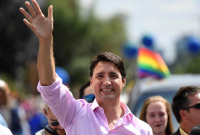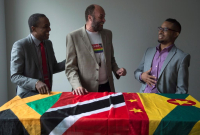Support strong Canadian climate journalism for 2025
Prime Minister Justin Trudeau will back up his promised apology for state-sanctioned discrimination against members of the LGBTQ community with reparations for the harm they suffered over the decades, says the Liberal MP handling the file.
But Edmonton MP Randy Boissonnault says the remedies will be separate from the regret.
"The two are not linked," the special adviser to Trudeau on LGBTQ2 issues said Tuesday.
Boissonnault has been consulting with lesbian, gay, bisexual, transgender, queer and two-spirited people — a term used broadly to describe Indigenous Peoples who identify as part of the community — on what the apology should entail.
He said the government is planning to introduce legislation by the end of December to expunge the criminal records of Canadians previously convicted of consensual sexual activity with same-sex partners.
The latest economic update set aside $4 million over two years to meet this goal.
The apology is also expected by the end of the year.
"You could link them in terms of the government being serious about getting this right and keeping our commitment to LGBTQ Canadians. That is definitely the link, but to say that expungements are linked to the apology, no, that is not what the link is," Boissonnault said Tuesday.
Boissonnault has not yet seen the legislation but said he'd like to see families of those who have already died enabled to have their records expunged too.
Earlier Tuesday, the New Democrats called on the Liberals to show they are serious about the apology by immediately bringing in measures to both expunge the criminal records and revise the dishonourable discharge records for LGBTQ people kicked out of the military.
NDP MP Randall Garrison, the LGBTQ critic for his party, said even though criminal laws, military rules and government policies regarding LGBTQ people changed decades ago, people are still dealing with consequences of their criminal records and discharges.
"These are real problems that continue to exist for people who suffered these injustices, even though they were many years ago."
Garrison said that can include restrictions on travelling and volunteering with community organizations, or, in the case of veterans, working with the Royal Canadian Legion.
Garrison also says redress measures should include plans to restore the pensions LGBTQ veterans would have earned had their discharges been classified as honourable.
"If you're in the military and your service record is revised, then you are automatically qualified for any benefits to which you were denied as a result of being kicked out," he said. "That's why the dishonourable discharge part is the key for those who were kicked out of the military."
The apology is not expected to come with compensation, an issue that is likely to be addressed by Canada-wide class-action lawsuits filed on behalf of LGBTQ people who say they were persecuted and forced out of their jobs in the military and federal government.
However, negotiations have been productive so far, said Doug Elliott, a Toronto-based lawyer and veteran gay rights activist who is representing the plaintiffs in the class actions, which have yet to be certified in court.
"I am cautiously optimistic that we are going to be able to resolve this without having to going to court."
Boissonnault also described the negotiations as "constructive" and hinted that resolution of dishonourable discharges could come through that process.
"We are working on a range of remedies," he said.
NDP Leader Jagmeet Singh said Trudeau should be the one to deliver the apology and he should do so in the House of Commons.
Boissonnault said he did not want to tread on the national advisory council tasked with crafting the apology but suggested that will be the approach.
"Both of those suggestions, which we are also getting from community members and from people who were wronged in the past, make sense to me," said Boissonnault, who co-chairs the council.





Comments